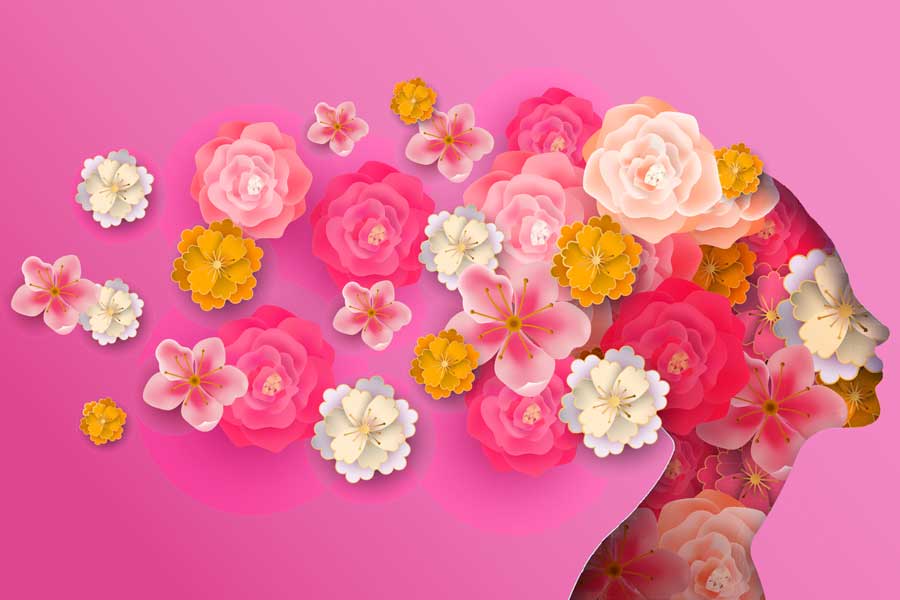Trusted for 25+ Years
Responsible Feminism

Dr. Lisa Lawless, CEO of Holistic Wisdom
Clinical Psychotherapist: Relationship & Sexual Health Expert

Standing On The Shoulders Of Our Foremothers
Women have long had to contend with sexist and misogynistic behavior, and it has been an arduous journey to have our rightful freedoms. Unfortunately, there is still a great deal of work to be done especially with it comes to sexual discrimination. Often younger women are oblivious to the sacrifices their foremothers made for them to have the rights they have now or even the rights they still do not have, such as equal pay and a right to manage the health of their own bodies. The patriarchy and its influences are still quite strong, and currently, many rights are being challenged.
The history of women's struggles throughout time is essential to be remembered and understood because, to know where we are going, it is also critical to understand our underlying motivation as well as where we have been. We must educate, discuss, advocate and be conscientious about having the clarity and wisdom we need to continue forward.
Ultimately, the goal of feminism is to achieve equality through our rights and treatment, and along the way, there has been a great deal of adversity and obstacles in attempting to achieve that. Equal does not mean identical because men and women have differences. Equality in feminism implies that there should be equal access to benefits and opportunities in society.
Just as there are incredible, caring men who value and respect women, there are also their counterpoints, and women still have their work cut out for them in overcoming the oppressions of the latter. In some cases, women have found themselves at odds with one another about the message they want. We must also acknowledge that there are some arguments that not only keep us from progressing but may even cause harm to our achievements.
Never Forget
Keep in mind that women were viewed legally as property, and it was not until the 19th Amendment to the Constitution passed in 1920 that women could vote after 72 years (started in 1848) for the women's suffrage movement to get that passed. Consider that for 72 years; women had to organize and fight to be considered a person because it meant there was an incredible amount of resistance by men to prevent it.
It was not that long ago (1975) that the United States Supreme Court advanced women's rights by ruling that women could serve jury duty. It may seem trivial, but the ruling in the case, Taylor v. Louisiana, had far-reaching consequences that gave women the right to participate in the administration of justice which also impacted other areas of government and the workforce. This led to further the fight for gender equality and women's rights.
Remnants Of These Beliefs Today
When social changes occur regarding the oppressed, they happen slowly because there is often a great deal of resistance. There are still remnants of women being seen as property today. Unfortunately, relationships are still seen by some hetero-cis men as transactional exchanges for goods and services where women are not seen as equals or as whole human beings. This is because these ongoing and outdated belief systems are deeply rooted.
There is still a tremendous need to catch up to the changes in the legal standing of women's equality in our society and in many relationships today. Thus, feminism remains essential to maintaining equality and continuing to fight to advance it until women are genuinely seen as equals in all aspects of society and in relationships.
What Is Patriarchy?
Patriarchy typically refers to a man holding power and control over a woman, while feminism is the movement to promote equality and equity for women. Patriarchy is a belief system that men are superior, which manifests culturally. This is predominantly pertaining to cisgender, heterosexual men, but it can also be seen in gay culture as well. This often translates into believing men should have more power and control than women, typically excluding the LGBTQ+ community and only acknowledging two genders. These biases can perpetuate inequality, discrimination, and violence toward women and marginalized groups such as those in the LGBT+ community.
Socialization in families, schools, the media, and religious institutions often contributes to attitudes toward gender roles. This is also perpetuated through social norms, expectations, language, media representation, politics, economic factors, and legal systems.
How are patriarchal beliefs perpetuated?
- Men's rights activists typically deflect the inequality and argue that feminism is a reverse form of oppression when they are called out for participating in discriminatory behavior. In addition, they may say that there was no problem until the discrimination was mentioned.
- In some cases, men see complaints about discrimination against women as a personal attack on themselves, even though there is no claim that all men participate in oppressing women. It can also be challenging for them to accept that a problem in society can exist that not all people participate in but is further enabled because of the lack of acknowledgment or active prevention.
- There are also women with internalized misogyny that argue against their own need for equity and equality because they are conditioned to accept it. This is especially significant in women who participate in patriarchal-inspired religions as it is often tied in with spiritual beliefs led by male leaders who put themselves in a paternal role.
- Male allies may attempt to address patriarchal issues without alienating women who may have internalized patriarchal ideals.
Justified Anger, Stress & Depression
When women express anger or frustration in response to the injustices they face, it's often seen as an overreaction. But it's important to recognize that these emotions are a healthy and normal response to what they're experiencing. It's a justified response.
Furthermore, these issues are not 'women's problems' to solve but rather societal issues that we all need to address. This means looking at where the problems are occurring and working to address them at the root. One place to start is by teaching boys and men to be better allies and to stand up against sexism, misogyny, and violence.
How Good Men Can Help
Good men often like to see themselves as protectors of women from other men. However, men need to be more than protectors of women; they need to be allies.
Typically, men see themselves as a protector of a woman only when they 'belong' to him or whom he cares about in some way (family, friends, etc.). Furthermore, he will only protect a woman when it comes to forms of violence from other men and when they are in close proximity to her. It often is in cases where the protection is in place because it bothers him.
Men are often perceived as protectors due to societal expectations and gender norms. However, men may struggle with emotional intelligence, particularly in relation to anger and violence. It's not that men are inherently violent, but rather that they may have a greater capacity for violence due to cultural and social conditioning.
It's crucial to address this issue and encourage men, especially boys, to develop healthy coping mechanisms and strategies for managing anger and frustration. By doing so, we can empower men to take control of their emotions and become more effective protectors in a way that is healthy and non-violent.
As an ally to women, a man should also use their voice against patriarchy and misogyny while showing support and standing up for causes that help women overcome things that harm them even when he is not around or is not personally affected by it. Men have the potential to be powerful allies to women to build a safer, more equitable world for all.
Extreme Feminism
Anything taken to an extreme can cause problems for a cause, and that is no different in the case of feminism. To move forward while ensuring equality for women, we must use caution not to go to extremes and end up hurting this vital movement. Here are examples of how a noble cause such as feminism can be taken too far:
Extreme Definitions Of Sexual Assault & Rape
Extremists seem to form in every group, and it is essential to understand that any overtly radical vantage point does not hold the gift of balance, justice, or true progress. Take, for example, the perspective that anytime a woman is under the influence of drugs or alcohol and a man has sex with her, it is considered rape.
This thinking neglects consideration for situations where a woman can still make rational decisions and consciously chooses to have consensual sex. It is irresponsible to say that in absolutely all cases, a woman who has sexual activity under the influence of drugs or alcohol is a case of rape.
This very stance diminishes the horror of what true rape is, and victims of it would most likely tell you that a romp with one's husband that is consensual after a few glasses of wine is much different than a man who has purposefully plied his date with alcohol or given her drugs so that she is unable to control her sexual boundaries. We must carefully discern what we say and understand that there are shades of gray in such situations, or we end up making some men victims of rare false accusations. We must be careful not to fail our sons while protecting our daughters.
This in no way counters the need to believe victims and advocate for their voices to be heard, but we need to be careful in what we define as rape when it comes to consensual sex under the influence of drugs or alcohol. Nor does it mean that the raising of boys is in need of serious change with regard to understanding consent, concern and respect for all humans when it comes to sex.
For more about this please see: Sexual Harassment & Stalking Guide which features a section called: Toxic Masculinity: Teach Boys To Behave Better.
The Responsibility Of Nude Pictures
Another example of extremes are when there have been cases where a girl has sent nude pictures of herself to a boy (both were minors), and it was the young man got in trouble with the law for sexting with a permanent label of sex offender along with jail time. How is this responsible and just? How is the girl not responsible for her choice to send nude pictures of herself, and why is the male a criminal in such a case?
This way of thinking makes it seem that a woman is impaired in her judgment and would have been coerced to send nude pictures of herself because she does not have her own sexual motivations. It simply denies that women are sexual beings and have a right to be sexual. In reality, it was ultimately her choice to send the nude pictures of herself, and to deny her responsibility for that decision is to say that she cannot be accountable for her own behavior (not to mention that sharing nude pictures of oneself really should not be a criminal offense if the recipient consents). If we are going to demand equality, we must also be culpable for our behavior and not be put into the role of being a victim when we are not.
In these examples, we must be careful not to deny that women are sexual beings and have a right to be sexual. The viewpoint which claims that in all circumstances, a woman who is under the influence during sex is not giving consent or when a woman is behaving promiscuously must have been coerced ultimately disenfranchises women.
Making Feminism Stronger
The only way to make women's voices stronger is to ensure that our words and behavior come from a place of true equality. To receive respect, we must give it to receive compassion and empathy. Ultimately, we must model the behavior we wish to see in others.





